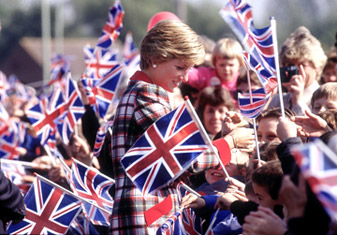
The British have always been good at silence — at family meals spent wordlessly; intense emotions expressed through a hand on the shoulder — but on Sept. 6, 1997, they surpassed themselves. London, the big, braying capital, was stilled as over a million mourners of Diana, Princess of Wales, kept vigil along the route to Westminster Abbey. The hush amplified the sounds of the cortège as it set out from Kensington Palace: the rumble of wheels on tarmac, the clopping of horses' hooves, and a bell that tolled at listless intervals. But as the procession came into view, turning out of the palace gates onto the public road, a shriek pierced the morning air: "Diana, my Diana!" and then a despairing wail: "We love you, Diana!" Britain's customary stoicism had been overwhelmed by raw, unbridled grief.
It has become commonplace in the decade since Diana's death on Aug. 31, 1997, to say that the festival of mourning which culminated in her extraordinary funeral marked a transformation — the moment when the old British virtues of reserve and silent suffering, of "mustn't grumble" and "could be worse," gave way to publicly expressed catharsis. The People's Princess had unlocked hearts, reordered values, presided at the triumph of emotional intelligence over cold intellect, of compassion over tradition.
The truth is harder to pin down, as tricky as the Princess herself could be. If Diana mattered, her significance rests in a series of interlocking social and political revolutions in a nation with a disproportionate impact on global culture, high and low — revolutions in which she participated, part unwitting catalyst, part canny activist.
This October will see the resumption of the inquest into her death by the British courts, the third inquiry to examine her fatal car crash in Paris. But even before these proceedings are concluded, there is little real doubt that Diana's death was precisely what it seemed to be at the time: a tragic accident.
Ten years on, Diana is still the world's most famous Briton, but many of her own compatriots don't seem sure if she did much more than wear designer dresses and shift a lot of tabloids. So here are a few incontrovertible facts. Diana shook up the British monarchy and speeded its modernization. She helped to tear down prejudices about AIDS. She raised awareness of eating disorders. She coalesced opposition to land mines. These are pretty hefty achievements for a woman of little education who mocked herself for being "thick as a plank." Add to these a more dubious accomplishment — her skillful manipulation of media images — and it's clear why, a decade after her death, Diana remains an inescapable presence in British life: mostly, but not always, benign; a restless and seductive ghost. It's time to peer into the many corners she still haunts.
Modernizing the Monarchy
When 19-year-old Diana asked Charles if he loved her, her churlish fiancé replied "whatever that means." Yet the Windsors thought they knew about love. It looked like patriotism. It was respectful and waved flags. It didn't sob on the streets or scream like a teenage girl glimpsing her rock idol. The quiet affection of the British people for Queen Elizabeth II has barely wavered during her 54-year reign. There was a low ebb early in 1998 — Diana's legacy — but even then the monarch's popularity rating dipped no lower than 66%. It's now 85%.
Of course, there has always been dissent: some 18% of Britons have called for the abolition of the monarchy since MORI, a polling firm, first began gathering opinions on the royals in 1969. That figure seemed as impervious to change as the Queen's fashion sense. Then Diana died and, for one week, republican numbers swelled.
The Queen never gives interviews — a wise policy that has helped to preserve the fraying mystique of royalty. But as her subjects wept on the streets and dying flowers carpeted the sidewalks, Elizabeth's Trappist vow looked either boneheaded or stone-hearted. Dickie Arbiter, a former press secretary to the Queen, Charles and Diana who was responsible for the media arrangements for Diana's funeral, says it was neither. "The Queen was always going to pay tribute to Diana," he says, but she planned from the outset to make her broadcast shortly before the funeral. "There was a furor because she was at [the Scottish castle] Balmoral and not down with the sniveling mobs in London. [But] William and Harry needed her more than hundreds and thousands of people keeping Kleenex in business."
